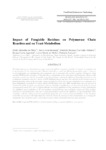Use este identificador para citar ou linkar para este item:
http://www.alice.cnptia.embrapa.br/alice/handle/doc/1059337| Título: | Impact of fungicide residues on polymerase chain reaction and on yeast metabolism. |
| Autoria: | SILVA, G. A. da  BERNARDI, T. L.   SCHAKER, P. D. C.   AGUSTINI, B. C.   MELLO, L. M. R. de   VALENTE, P.   |
| Afiliação: | GILDO ALMEIDA DA SILVA, CNPUV Taís Letícia Bernardi, ²Instituto Federal de Educação Ciência e Tecnologia do Rio Grande do Sul, Sertão, Rio Grande do Sul, Brasil Patrícia Dayane Carvalho Schaker, mbrapa Uva e Vinho - Laboratório de Microbiologia, Bento Gonçalves, Brazil BRUNA CARLA AGUSTINI, CNPUV LOIVA MARIA RIBEIRO DE MELLO, CNPUV Patrícia Valente, Universidade Federal do Rio Grande do Sul, Porto Alegre, Rio Grande do Sul, Brasil. |
| Ano de publicação: | 2016 |
| Referência: | Brazilian Archives of Biology and Technology, v. 59, e16160241, Jan./Dec. 2016. |
| Conteúdo: | The indiscriminate use of pesticides on grape crops is harmful for consumers´ healthin “in natura” consumption and in the ingestion of wine and grape juice. During winemaking, a rapid and efficient fermentation stage is critical to avoid proliferation of contaminating microorganisms and to guarantee the product´s quality. Polymerase chain reaction (PCR) has the advantage of detecting these contaminants in the early stages of fermentation. However,this enzymatic reaction may also be susceptible to specific problems, reducing its efficiency. Agricultural practices, such as fungicide treatments, may be a source of PCR inhibiting factors and may also interfere in the normal course of fermentation.The action of the pesticides captan and folpet on PCR and on yeast metabolism was evaluated, once these phthalimide compounds are widely employed in Brazilian vineyards. DNA amplification was only observed at 75 and 37.5 µg/mL of captan concentrations, whereas with folpet, amplification was observed only in the two lowest concentrations tested (42.2 and 21.1µg/mL).Besides the strong inhibition on Taq polymerase activity, phthalimides also inhibited yeast metabolism at all concentrations analyzed.Grape must containing captan and folpet residues could not be transformed into wine due to stuck fermentation caused by the inhibition of yeast metabolism. Noncompliance with the waiting period for phthalimide fungicides may result in financial liabilities to the viticulture sector.The use of yeasts with high fungicide sensitivity should be selected for must fermentation as a strategy for sustainable wine production and to assure that products comply with health and food safety standards. Key words: fungicide;PCR inhibitors; stuck fermentation;Taq polymerase inhibitors; yeast growth |
| Palavras-chave: | Fungicide PCR inhibitors Stuck fermentation Taq polymerase inhibitors |
| Tipo do material: | Artigo de periódico |
| Acesso: | openAccess |
| Aparece nas coleções: | Artigo em periódico indexado (CNPUV)  |
Arquivos associados a este item:
| Arquivo | Descrição | Tamanho | Formato | |
|---|---|---|---|---|
| Gildo16784324babt167843242016160241.pdf | 377,73 kB | Adobe PDF |  Visualizar/Abrir |









